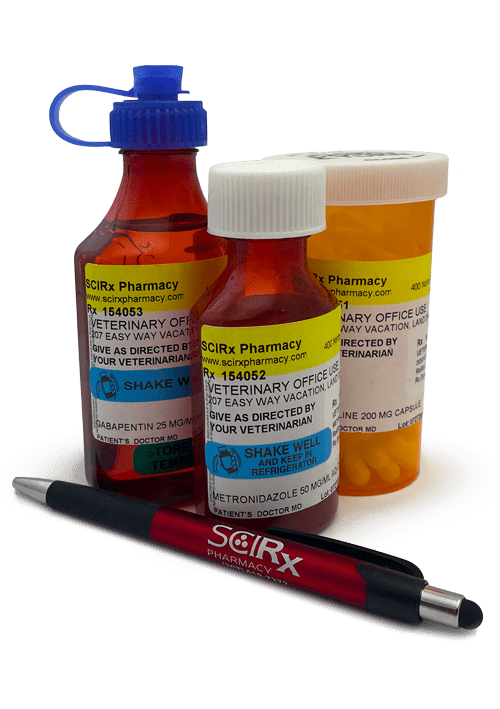In the fall of 2022, a bill was passed in the Maine legislature to allow for compounding of “limited office” use medications. In mid-May after reviewing the Maine Board of Pharmacy introduced new regulations allowing for the compounding of non-patient – specific drugs for veterinarian office use. The compounded drug is intended to be dispensed for emergency conditions or urgent situations. The quantity to be dispensed per patient according to the regulations should not exceed a 14-day supply. This does not limit what the practice can have on hand. The new regulations allow the veterinarian to prescribe a medication and follow up later with a prescription to avoid a pet suffering or death where there is no timely access to a compounded medication.
We at SCIRx, are excited about this new opportunity to supply Compounding Medications for Veterinarian Office Use to area practices. For more information, questions on delivering or mailing of compounded medications please call the pharmacy and one of our team members will be glad to review. Below are the new regulations established by the Maine Board of Pharmacy for your review.
02 DEPARTMENT OF PROFESSIONAL AND FINANCIAL REGULATION
392 MAINE BOARD OF PHARMACY
Chapter 42: COMPOUNDING DRUGS FOR VETERINARIAN OFFICE USE
Summary: This chapter establishes the terms and conditions for compounding drugs for veterinarian office use pursuant to 32 M.R.S. §13722(1)(B-2). This chapter was developed in consultation with the Maine State Board of Veterinary Medicine, in accordance with P.L. 2021, ch. 289, Sec. 15.
1. Definitions.
1. Compounding drugs for veterinarian office use. “Compounding drugs for veterinarian office use” means the compounding of nonpatient-specific drugs for veterinarian office use according to the terms and conditions described in this chapter.
2. Nonfood-producing animal. “Nonfood-producing animal” means any domesticated animal including canine, feline, fowl, bird, fish, or reptile, except those animals intended for consumption or whose products are intended for consumption by humans or other animals.
2. Pharmacy Requirements and Specifications. The pharmacy compounding drugs for veterinarian office use shall comply with the United States Pharmacopeia or Current Good Manufacturing Practices and all applicable controlled substance laws and regulations.
3. General Requirements for Compounding Drugs for Veterinarian Office Use
1. Content of drug orders. The drug order shall include the name, address and telephone number of the licensed veterinarian;
2. The pharmacy must inform the veterinarian that:
A. The compounded drug is being provided for veterinarian office use only;
B. The compounded drug will only be dispensed or administered to nonfood-producing animals that are patients of the veterinarian with a valid veterinarian-client-patient relationship;
C. The compounded drug will only be dispensed or administered for the treatment of emergency conditions or urgent situations, when, as determined by the prescribing veterinarian, urgent treatment is needed to avoid animal suffering or death and there is no timely access to a compounding pharmacy to compound and dispense the drug under a patient-specific prescription;
02-392 Chapter 42 page 2
D. The quantity of the compounded drug dispensed by a prescribing veterinarian will not exceed a 336-hour supply (14-day) or the smallest uniform manufactured size sufficient to treat the condition; and
E. The prescribing veterinarian will provide instructions to owners to contact the prescribing veterinarian immediately if a compounded preparation has caused an adverse event or the owner suspects a defective drug product, and the veterinarian will report this information to the compounding pharmacy and the U.S. Food and Drug Administration Center for Veterinary Medicine.
3. Verification. The pharmacist who receives an order for compounded drugs for veterinarian office use shall record the order and verify the identity of the licensed veterinarian, and, if applicable, the identity and authority of the veterinarian’s agent.
4. Labeling requirements. Compounding drugs for veterinarian office use shall be labeled in a conspicuous and legible manner, as appropriate for the size and attributes of the container.
The label shall include:
1. Pharmacy name, address, and telephone number;
2. Date of distribution;
3. Name, address, and telephone number of the licensed veterinarian who placed the order;
4. The name and strength of the compounded preparation or a list of the active ingredients
and the strength of the active ingredients in the compounded preparation;
5. The quantity of compounded preparations;
6. Cautionary statements if appropriate for the drug;
7. An appropriate beyond-use date as determined by the pharmacist in compliance with United States Pharmacopeia and the National Formulary (USP-NF) standards for pharmacy compounding; and,
8. Text to read as follows:
“Compounded for Veterinary Office Use Only. Intended only for dispensing and administration for nonfood-producing animals as determined by the prescribing veterinarian.”
5. Record-keeping requirements
The pharmacy compounding a drug pursuant to this chapter shall comply with all other laws and rules of the board concerning record-keeping. Any pharmacy compounding a drug pursuant to this chapter shall maintain activity records of the distribution of the compounded drug to the veterinarian and have the ability to retrieve compounding and distribution records by both preparation and by specific veterinarian, if requested by the board or its agent. The board or its authorized agent may inspect and make copies of any and all records of shipment, purchase, compounding record activities, quality control, and sale of these items provided, however, that such inspection shall not extend to financial data or pricing data.
02-392 Chapter 42 page 3
6. Defective Drug Products and Adverse Events
If a pharmacist learns of an adverse event or a suspected defective drug product involving compounded preparations the pharmacy prepared, it shall without delay report this information to the board and any and all licensed veterinarians to whom, according to the pharmacy’s records, the compounded preparation was provided. The pharmacist should also notify the U.S. Food and Drug Administration of any adverse event or product defect associated with the use of the drug within fifteen (15) days.
STATUTORY AUTHORITY:
32 M.R.S. §§ 13720, 13723, 13722(1)(B-2)
EFFECTIVE DATE:
May 15, 2023 – filing 2023-070

